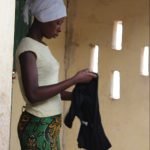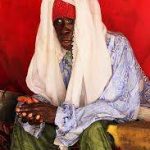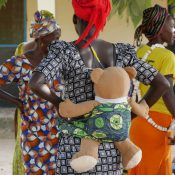The Gambia is a small country in Africa completely surrounded by Senegal except for the West Coast; the Atlantic Ocean. It has been politically isolated for many years but this has changed since the overthrow of the former dictator President Yahya Jammeh in 2016. Ever since there seems to be a different flow. People are still ery poor, but in general more open and optimistic about the future. Almost 50% of the population live in poverty still as we speak today though.
President Jammeh was known for his ‘Alternative treatment programs’ and Infertility (along side with HIV/aids, asthma and certain types of cancer) was one such program. This did not contribute to the awareness and education on the subject. In recent years more and more initiatives are rising up trying to bridge the gap created during that time.
Yet, myths and spiritual beliefs especially on the subject of fertility are still very much alive today.
The Spirit Husband – “Kuntofengo’

When asked, many women in rural Gambia will explain that ‘the spirit husband’ or ‘Jinn’ is the cause of her problem with infertility.
The spirit husband sometimes starts to appear in young women even before marriage. She may get headaches or dizzy spells. After marriage the headaches tend to get worse, and the woman may get nightmares.
It it thought that the spirit husband, who is intensely jealous of the material-world husband, gets more and more angry and ultimately causes infertility, miscarriage or even infant mortality.
Without offspring the marriage is doomed and the spirit husband happy. It is understood that Kuntofengo cannot be treated with Western medicine. So treatments are sought from herbal and spiritual sources.
Spiritualists – ‘ The Marabout’

The ‘Marabout’ or ‘Morro’ is a healer who practices spiritual medicine rooted in Islam. Though most of the marabouts are male, the Gambia has some well-known female marabouts as well.
The marabout may offer a ‘Juju’, a piece of paper with a verse from the Quran written on it wrapped in leather that can be worn on around the arm or waist, or braided in the hair.
Sometimes he offers ‘Nassoo’, holy water. A sacred text is submerged in water, infusing the water with the spiritual power to heal. The Nassoo can be used to bath with or to drink.
Herbal Treatment – ‘Drinking Tablets’

Several herbalists without any special religious knowledge or means provide plant derived medicines.
A well known form of herbal treatment for women who suffer from reproductive problems is a concoction that works as a strong laxative. The diarrhea it causes is presumed to remove any blockage in the womb that might prevent the woman from becoming pregnant.
One well known lady herbalist ‘Mama Isatou’ is in fact specialized in the treatment of infertility. Unlike most traditional healers she always involves the husband in the treatment as well. She often brings her patients to Katchikally (described below) for the final additional washing.
Sacred Places – The Crocodile pools

The Gambia knows 3 sacred crocodile pools. Folonko in Kartong, Berending and Katchikally in Bakau. They are mainly fertility shrines where people seek help for their difficulties.
Most well known is Katchikaly. It is an ancient sanctuary, located in the middle of the little town of Bakau. The pool is inhabited by some 100 Nile crocodiles. The crocodiles are laying in and around the pool it is said that they eat on fish only.
Gambian women come here to wash themselves with the holy waters of the pool, helped by women of the Bojang clan who have been specially trained in the rituals.
Want to learn more about Katchikally
Social Support Groups – ‘The Kanyaleng’

A special role in Gambian societies hold the Kanyaleng. The Kanyaleng are women who all have in the past, or still are struggling with infertility or child mortality.
Most every village in the Gambia, both rural and urban have their own Kanyaleng Kafoo. They are well respected and have a special role in their communities. The Kanyaleng are excellent singers, dancers and drummers. They often perform at public gatherings and celebrations such as weddings and naming ceremonies and are known for their playful bold acting and ridicule.
Kanyaleng membership is a very useful coping strategy. The solidarity of women of the same village or community, united by their struggles to meet standard of womanhood as mothers, and the pressure society puts on them, create strong support networks. Furthermore membership helps them improve their long term status, both social and economic.
More background on The Kanyaleng